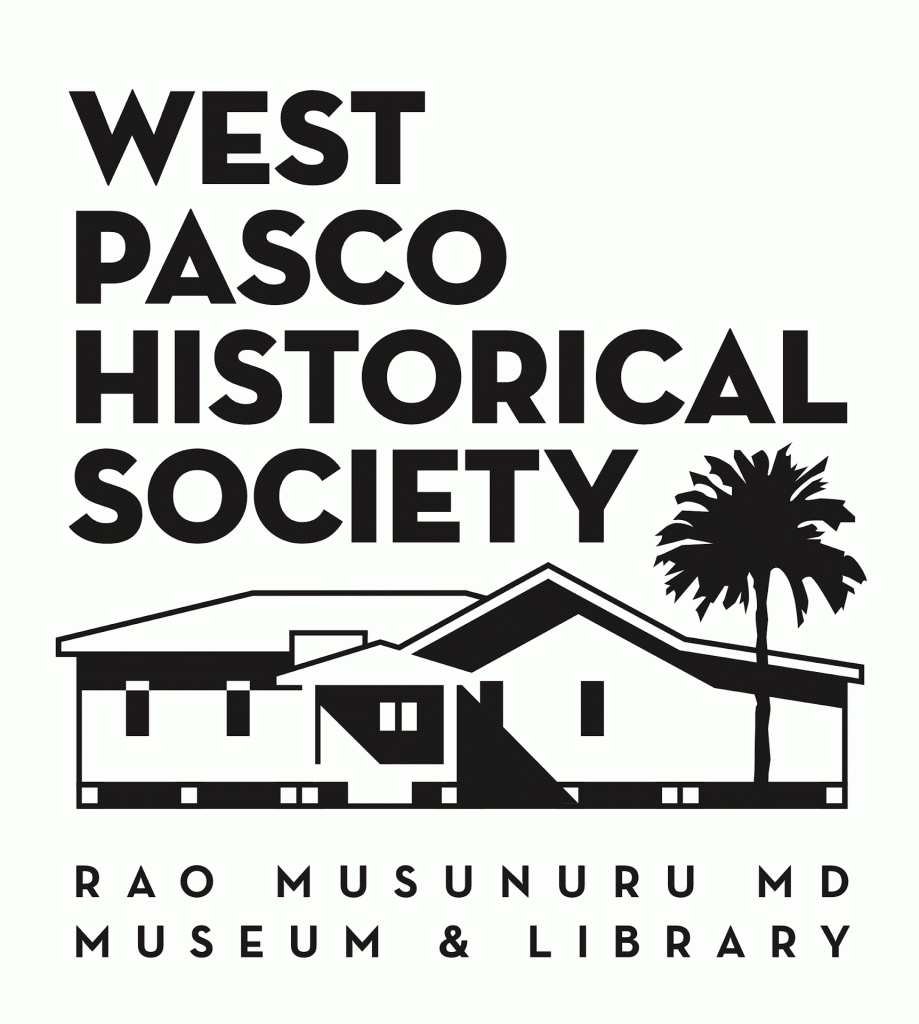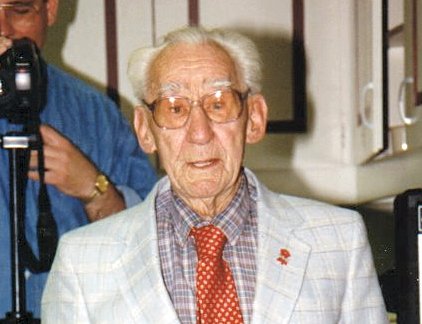HISTORY OF PASCO COUNTYJoe Herrmann (1912-2002)Entrepreneur, Philanthropist Celebrates 90 Years
This article appeared in the Tampa Tribune on May 28, 2002. Mr. Herrmann died in September of that year. By CAROL JEFFARES HEDMAN An old friend once said “God blessed east Pasco County when he let Joe Herrmann move here.” Herrmann has touched many lives in his 90 years. An entrepreneur since his teenage years, an enthusiastic civic servant, a devoted husband and father of nine, and a friend to all who know him, Herrmann will mark his 90th birthday Saturday. But plenty of family, including his children and many of his 30 grandchildren and 26 great-grandchildren, attended a special birthday celebration May 26 at the church that drew the Herrmann family to San Antonio nearly 77 years ago. Joseph John Herrmann was born June 1, 1912, in Columbus, Ohio, to a German immigrant who came to the United States in 1896, landing at Ellis Island at the age of 16. Lucius Herrmann was born in Neisse, in Silesia, Germany, in 1880. During pre-war time it became compulsory that young men became soldiers. But Lucius Herrmann was a pacifist and left what in post-war years became Czechoslovakia and later Poland. He went to Switzerland to learn the baking and confectionary trade from the Jacobs Suchard Company that was bought by Kraft in recent years. After perfecting his hand-dipped chocolates and bakery skills, Herrmann came to the United States and settled in St. Louis. By 1908, Lucius Herrmann was living in Columbus, Ohio, where he met Helen Veronica McSweeney. The couple was married in 1911. “I came about a year later and disrupted their party,” Joe Herrmann said. Joe Herrmann’s father worked as a baker at night. In his spare time he became an apprentice in a real estate company where he also invested in property in Florida. With his wife and now two children, Lucius Herrmann set out to find the real estate he had bought in Florida near Wauchula, which at the time was in DeSoto County. What Herrmann found was swampland. Herrmann “took his licking,” his son said, and moved on to Lake Worth where the family stayed in a rooming house. Teaching The Teacher Having been home-schooled in the early years, Joe Herrmann was first sent to school in the third grade. But he only stayed one day. “The teacher wrote on the blackboard “The Volsheviks have taken over Russia.” I said, ‘Teacher, that’s a ‘B.’ It’s Bolsheviks.’ She said, ‘OK, you’re so smart you go home,’ ” Herrmann recalled. “My father took my side of the story. It was not exactly the same as the teacher’s.” Displeased with public schools, the Herrmanns home-schooled their son until the family moved to San Antonio in 1925. Lucius Herrmann learned from a local pharmacist about a Catholic school in San Antonio. He decided it was worth moving for and the family relocated again to San Antonio, which had been founded as a Catholic colony in 1881. Arriving in July 1925, Joe Herrmann entered the eighth grade at St. Anthony School and completed his first full year of classroom studies. He then went on to nearby St. Leo College Preparatory School, graduating in 1930. Soon after arriving in San Antonio on July 25, 1925, 13-year-old Joe began his first real job delivering The Vanderbilt, a short-lived newspaper out of Miami. He soon added to his delivery routes The Tampa Tribune, Tampa Times and Jacksonville Times Union. On Sundays he also delivered The Atlanta Journal and Constitution. The teenager also worked as a golf caddie at Lake Jovita Golf Course. And his enterprising ways came in handy when the Bank of Dade City closed. Lucius Herrmann had already started building what was to be called The Jovita Building on Curley Street in San Antonio. He had all the materials purchased and ready for construction. But on July 12, 1926, when the structure was only some 18 inches off the ground, the job superintendent came and said to the workers, “Boys, pack up your tools. The old man’s money is gone. The bank’s closed up,” Herrmann recalled. Lucius Herrmann lost all his money in the bank closure. One worker remained, with a promise he would be paid one day. All the Herrmann clan pitched in and finished the two-story building. Young Joe earned enough money from his paper routes and caddying to feed all 10 in the family, as well as finally pay the worker. In addition to his paper routes, Joe also subsidized the family’s income by selling radios. In 1927 he organized the Jovita Radio Store, which eventually began to sell appliances. It was located in the building where San Antonio Pottery is situated on Curley Street. Lucius Herrmann went back into the baking business. His brother, Paul, also came to San Antonio from Montevideo, Uruguay, where he had opened a bakery. Tiring of big cities, he came to San Antonio and took over Albert Kiefer’s Bakery. But with a population of 400, he tired of the small town, too, and asked Lucius to take over that bakery, located on Pennsylvania Avenue where Poncho Villa Mexican restaurant now stands. Joe would deliver the bread his father made on his bicycle, taking the 5-cent loaves straight to the customers’ doors. When Paul Herrmann left San Antonio he went to Jacksonville and opened a bakery there. During the summer he would work at a resort in the Adirondack Mountains. He was killed in a car accident on a trip back to Florida in 1930. His widow turned to Lucius for help at the bakery and eventually convinced him to buy the Jacksonville bakery. The Herrmann family moved to Jacksonville. “He [Lucius] convinced everybody but me” to leave San Antonio, Joe said. He also convinced one of Joe’s best friends, Rose Ullrich, to work at the bakery there. Rose, born in San Antonio, had been his longtime friend. “I don’t know at what point those things become permanent,” Joe said. But the relationship did. Rose and Joe were married Aug. 6, 1935. Their first child, Eddie, was born the next year. Through 1959 the couple had eight more children, alternating boy and girl with each birth. All but three live in Pasco County and all but one live in Florida. They are Margaret Beaumont, Paul, Rosemary, Joseph of Plant City, Barbara Sessa, John, Mary Sue Keenan of Wellington, and Gregory Lucius Herrmann of Decatur, Ga. Helping The War Effort Like his father, Joe Herrmann was deferred from being drafted during World War II. He already had a family and was running a business whose male employees had either volunteered or been drafted. But even without a uniform Joe was still patriotic and continued to serve his country. He sold war bonds, enough to earn him the Army-Navy E, an award of “excellence” given for instilling patriotism to those who invested in these “loans to America.” He even sold bonds to people who were selling war bonds themselves. “He could sell you an empty paper bag and have you think it was filled with a million dollars,” said Betty Herrmann, widow of Joe’s uncle Steve [should be Joe’s brother Steve]. Joe Herrmann also served as air-raid warden and when supplies couldn’t be delivered because of wartime rationing, he would make trips to Tampa and pick up items needed for other businesses, including his competitors. The Herrmanns especially liked helping out youth, providing transportation for skating parties at Crystal Springs and regularly giving hayrides in the back of their truck. Similar trips were made to the circus. Joe would also show movies in a field for the townsfolk, and the couple would host community Easter egg hunts and apple-bobbing contests at Halloween. Their house and businesses would be adorned with Christmas decorations and music piped outside throughout the holidays. Herrmann founded Saf-T-Gas in 1939. Originally bottled butane, the company later sold propane gas and had locations in Plant City, Zephyrhills, Dade City, Bushnell, Wildwood and San Antonio. Herrmann remained in the gas business until retiring in 1988. Other ventures include being a State Farm Insurance agent, and he started Culligan Soft Water Service in 1946. He sold the Culligan franchise to his son Eddie in 1956. In 1955, after two years of research, Herrmann and Dade City businessman Joe Collura founded the San Antonio Citizens Federal Credit Union. ‘Herrmannville’ Herrmann was also a land developer who had his 40 acres annexed into the city. The area, jokingly called Herrmannville, was also subdivided into a small neighborhood called Rosewood near his business ventures in San Antonio. In 1947, after contributing $100 along with 35 others to buy the 40-acre fairgrounds in Dade City, Herrmann became a charter member of the Pasco County Fair Association Inc. He served the nonprofit association as president and is director emeritus. After the fair association received donations of antique farm equipment, Herrmann was one of those suggesting the start of the Pioneer Florida Museum Association Inc. He has held every office in the Knights of Columbus and was Grand Knight of the San Antonio Council 1768. He also served as district deputy and on several state committees of the Knights of Columbus. Herrmann has been involved in the San Antonio Rattlesnake Festival since its early days. He served on the San Antonio City Council for many years and was mayor from 1957 to 1962. He was also appointed by the governor in 1958 [should be Nov. 13, 1957 -jm] to serve the unexpired term of A.H. Schrader Sr. who died while holding office. Herrmann was recognized last week by the Pasco County Commission when Schrader’s grandson, County Commissioner Ted Schrader, presented him with a certificate in recognition of his dedication to the county. Earlier this year, Herrmann furnished framed “In God We Trust” certificates to Pasco’s County and municipal governments for all public facilities under their jurisdiction. Even while not holding office, Herrmann could be found at most political meetings, keeping abreast of the happenings in his county. He has always been a promoter of Pasco County when traveling around the country in his Airstream travel trailer. Herrmann also has always supported his local parish, St. Anthony of Padua. In recent years he and his wife established the Herrmann Charitable Trust to support church- related and other charitable organizations. Joe and Rose are considered “angels” to many. When Rose died May 29, a letter attesting to that came from a man who, as a boy, the Herrmanns had allowed to pay 50 cents a week, with no interest, to buy a bicycle. “I think he’s been blessed because of what he’s done,” said Herrmann’s son, Eddie. |

